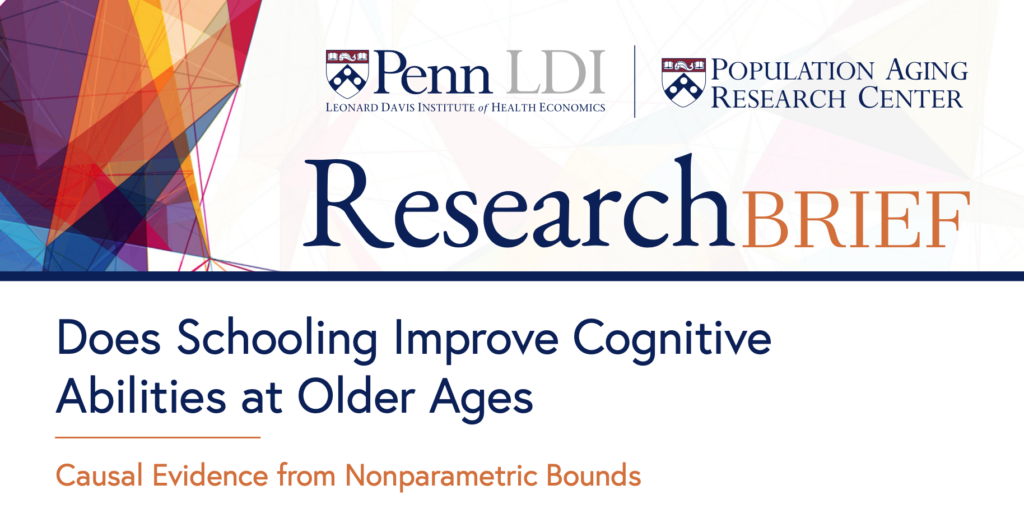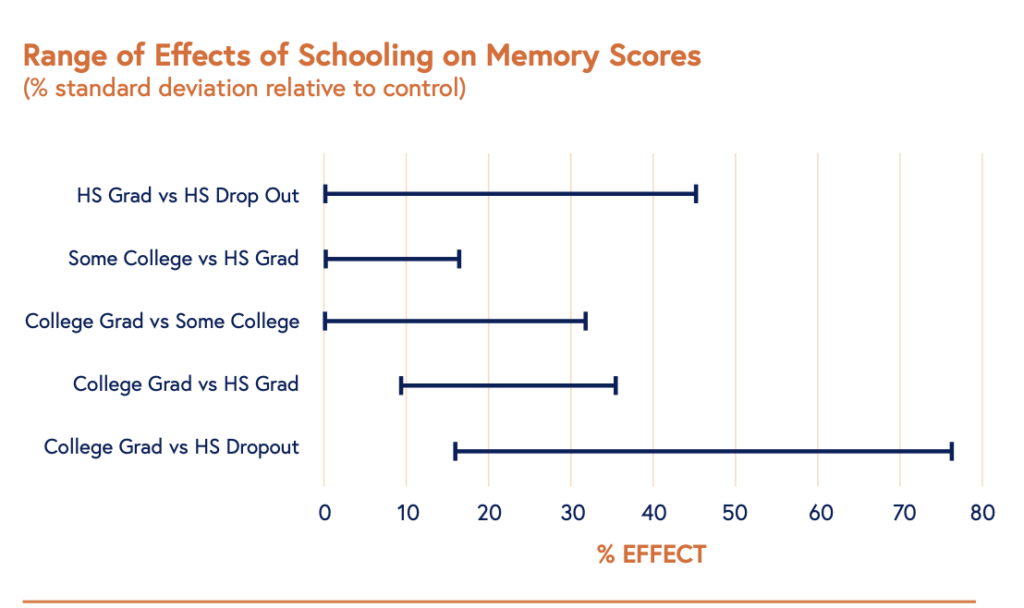
The Long-Term Care Experiment Everyone is Watching
Washington State’s First-in-the-Nation Insurance Plan Begins Payouts in Mid-2026, and Researchers Will Weigh its Effect on Care, Costs, and the Long-Term Care Markets
Improving Care for Older Adults
Brief

In older U.S. adults, higher levels of education resulted in better performance on tests that assess cognitive function in a study using innovative methods that provided average causal effects of schooling on a broad population. Higher cognitive scores were most prominent among college-educated individuals compared to high school graduates: A college education led to the equivalent of a 1.4- to 5.4-point increase on a 100-point cognitive test.
An estimated 11% of U.S. adults aged 65 or older have dementia, and as the population ages, dementia cases
are predicted to nearly double from 5.2 million in 2019 to 10.2 million by 2050. Understanding how education levels may affect cognitive decline and presumably dementia is important for projecting future dementia in the population and potentially helping individuals understand and possibly reduce their risk.
Prior research has suggested a link between more schooling and better later-life performance on cognitive tests. However, most of these studies provided suggestive associations rather than causal estimates. When prior studies did provide causal estimates, inferences were generally based on changes in educational levels after compulsory schooling laws were enacted. This limited estimated causal effects of schooling to the lower grade levels targeted by the laws and the individuals affected by them.
In this study, the authors expanded the evidence about causal effects of schooling on older adults to higher levels of schooling, such as attending college, and to a broader population. The authors applied advanced methods to data from a national, longitudinal cohort study representative of U.S. individuals over age 50.

The results generally supported the prior literature, with higher levels of schooling linked to higher performance on cognitive tests. However, the results revealed a wide range of potential effects of education. For educational gains from grade school to high school, the effects ranged from the possibility of no impact to a maximum of 46% of a standard deviation (or 0-7 points on a 100-point cognitive test). This finding implies that each additional grade of educational attainment improved scores by between 0% to 12% of a standard deviation, given a difference of about 4 grades of schooling between high school graduates and grade school individuals in the study sample.
For higher levels of education, the effects were clearly positive. The study provides new findings on the effect of graduating from college compared to high school. This increase in educational attainment led to better memory test scores (9% to 36% of a standard deviation).
Predicting future rates of dementia requires understanding how younger generations with increased educational levels will impact future risk. Results from this study suggest that education may not have a strongly protective effect at the high school level. Still, the potential benefits from schooling are noteworthy, with definite reductions in the risk of cognitive decline among people graduating from college.
Although the study controlled for factors that might also affect cognitive test performance such as age, remaining questions include the effect of other factors, such as school quality or race and ethnicity and their effect on school experience and educational opportunities. Whether adult education or stimulating activities in adulthood affect cognitive performance similar to early childhood education is unknown.
Important questions remain about how education influences later-life cognition and overall health. Possibilities
include the ability to process health information; work jobs that build cognitive skills and cognitive reserves; and attain careers that lead to higher income and better health care access.
Most studies on schooling and cognitive ability in older ages focus on high-income countries. The authors are now analyzing data from countries with demographics that differ from the United States. For example, differences in income level and chronic disease risk (e.g., diabetes) may affect dementia risk.
The study used data from a national cohort that is more representative of the U.S. population than previous studies. The data came from the Health and Retirement Study, a longitudinal cohort study that surveys and interviews a representative sample of approximately 37,000 people aged 50 or older in the U.S., with the oldest individuals born in 1931-1941. Within the study, some individuals aged 65 or older were tested for cognitive performance using the Harmonized Cognition Assessment Protocol (HCAP). Components of the surveys and interviews in HCAP cover immediate and delayed memory, verbal fluency, and executive function, among other areas.
The authors used advanced methods to account for more potential confounding factors, estimate upper and lower bounds of educational effects, and infer causality between a wide range of schooling levels and cognitive performance for a broad population. This offered significant advantages over the methods used in prior related studies.
The authors confirmed their findings with additional analyses using data from a different longitudinal U.S. study, the Midlife in United States Development Study (MIDUS).
Source Publication: Vikesh Amin, Jere R. Behrman, Jason M. Fletcher, Carlos A. Flores, Alfonso Flores-Lagunes, and Hans-Peter Kohler, Does Schooling Improve Cognitive Abilities at Older Ages: Causal Evidence from Nonparametric Bounds, University of Pennsylvania Population Center Working Paper (PSC/PARC) — Posted May 2022

Washington State’s First-in-the-Nation Insurance Plan Begins Payouts in Mid-2026, and Researchers Will Weigh its Effect on Care, Costs, and the Long-Term Care Markets

Issue Brief: Understanding Gaps and Opportunities to Advance Research and Policy

An LDI Fellow Draws on Historic, Paradigm-Shifting Treatments in Depression and Obesity to Consider What Meaningful Breakthroughs in Dementia Care Could Look Like

A Penn LDI Virtual Panel Looks Ahead at New Possibilities

Lessons from the Past, Imperatives for the Future

Technology Helps Older Adults Stay at Home—But May Delay Necessary Transitions to Higher Levels of Care